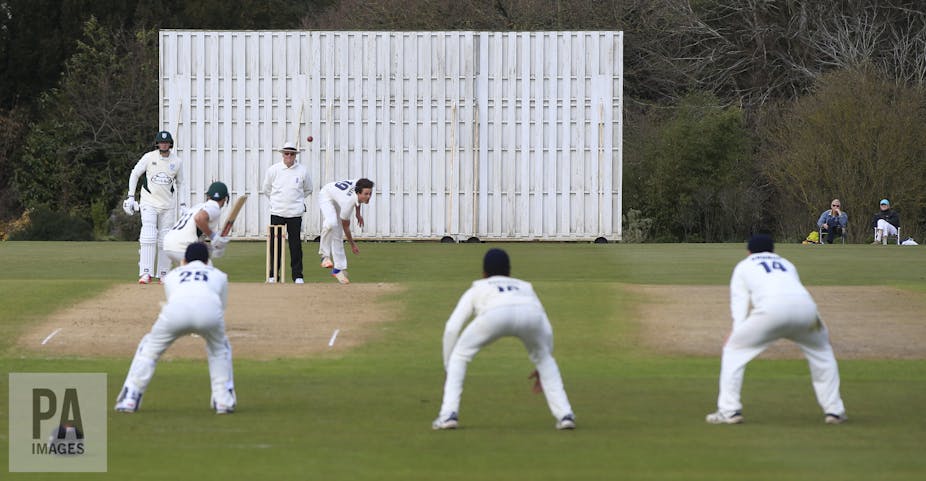There is an inevitability about the start of the county cricket season. Rain will stop play in many games – and somewhere in England a team of amateur twenty-somethings will get roundly beaten by their professional opponents. This will bring on a round of whingeing about the “first-class” status of university cricket.
First-class cricket was once the sole privilege of Oxford and Cambridge University cricket clubs. But since 2000, six regional Marylebone Cricket Club (MCC) university centres of excellence have been involved in matches of this status. The aim of these centres is to train talented young cricketers at the highest level, while giving them the opportunity to further their education.
Around one-fifth of the current English professional cricketers were produced through the MCC universities scheme. The clubs are funded through an annual £46,000 stipend to each club (cut from £92,000 in 2016) to maintain a programme of training and competition that is a recognised part of English cricket’s elite development structure.
Every year, students play two rounds of first-class fixtures against county opposition: Cardiff played Glamorgan and Hampshire this year, for example. They essentially act as warm-up games for county teams before the start of the County Championship, as well as being a “shop window” for university players – many of whom will be hoping to get signed by a county team during or following their studies.
This year was another difficult start to the season for the MCC Universities (MCCUs), who were unable to prevent their opening first-class fixtures from becoming another damp squib – the MCCU players didn’t fare very well against the professionals in any match. Cue the murmuring and perennial debate – most recently from several county chairmen – among those keen to protect the meaning of first-class cricket as their own elite preserve and not apply it to student games.
But there are significant benefits for all MCCU students who take part in a “first-class” scheme, both on and off the pitch. Former England captain Michael Atherton, a Cambridge graduate, has argued that the scheme’s first-class status is part of what makes university an attractive proposition for talented young cricketers unsure of their long-term career prospects in and out of the game.

The university system, Atherton says, “acts as buffer between amateur and professional game”. It delays the speed at which young players commit themselves to, and become narrowed by, the occupational demands of professional sport. Students can find their own way, and aren’t pushed into following either sport or education – they can choose both.
Having spent three years examining the experiences of this cricketing population, I agree with Atherton. My own research has shown that MCCU centres of excellence are more than just a route into professional cricket. By combining a vocational experience with higher education, they can really help young people at a transitional period of their lives.
The young men and women who choose the MCCU route have the opportunity to experiment with a cricket identity without commitment, while exploring what else they are capable of. The scheme gives student players the space to consider what they want from their lives and careers, working on their education and sporting prowess as they go.
During their time as university cricketers, the players experience a tension between aspiration and reality. The MCCU system teaches them about the working lifestyles of professional cricketers and the associated pressures of travelling, staying away from home and playing on a daily basis. By balancing play and study, the students are forced to consider what cricket means in relation to their own futures.
For some, the experience helps them to realise that cricket is the path they want to follow and that the MCCU will help them to achieve their ambition. For others, however, being an MCCU student dilutes their cricketing identity, but helps them to look for and develop other meaningful career options.
This journey of self-discovery that student cricketers find themselves on via the MCCU pathway becomes even more pertinent when you realise that the average age a professional playing career ends is 26. Some leave fed up, or burnt out by the precariousness of short-term contracts, or a lack of first-team opportunities. Most simply find themselves surplus to requirements, forced to make a sudden change just as friends who have developed careers in other fields are beginning to work it all out.
In my view, however, MCCU success should not be based on the volume of first-class cricketers produced, or on how well the students perform in difficult conditions against the counties. It should be on their role in helping young people develop the self and situational knowledge to make positive identity decisions – and decide what they want to be.
In cricketing terms, the university system is about enabling talented cricketers to “find their level” within the game. It inspires them to think beyond cricket – and gives them the flexibility to pursue cricket out of choice rather than necessity. But for this to work, young cricketers require more than the opportunity and time for self-exploration. They need an authentic experience to anchor their exploration to, that removing the MCCU’s “first-class” status will ultimately undermine.

